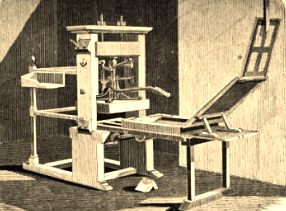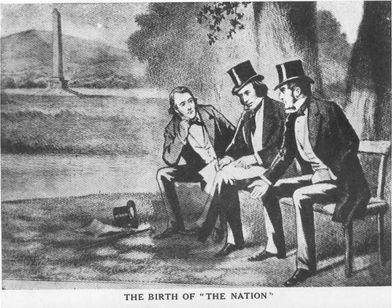THE NATION

Picture shows 19th Century printing press
Charles Gavan Duffy was one of the founders of “The Nation” and became its first editor; the others were Thomas Osborne Davis, and John Blake Dillon.
All three were members of Daniel O'Connell's Repeal Association and would later come to be known as Young Ireland.
The paper, under Duffy, transformed from a literary voice into a 'rebellious organization'
As a result of The Nation's support of Repeal, Duffy as proprietor was arrested and convicted of seditious conspiracy in relation to a Monster Meeting planned for Clontarf, Co. Dublin.
He was released after an appeal to the House of Lords. In 1850 he formed the Tenant Right League to bring about reforms in the Irish land system and to protect tenants' rights.
In 1852 he was elected to the House of Commons for New Ross.
In 1856, despairing of the prospects for Irish independence, he resigned from the House of Commons and emigrated with his family to Australia.
The Nation was an Irish nationalist weekly news paper published in the 19th century.
Printed first at 12 Trinity Street, Dublin, on 15 October 1842, until 6 January 1844, the paper was afterwards published at 4 D'Olier Street from 13 July 1844, to 28 July 1848, (when the issue for the following day was seized and the paper supressed) and at Lower Abbey Street on its revival in September, 1849.
A radical newspaper in 1843 it published what was to become one of the most famous examples of 19th century Irish nationalist poetry, “The Memory of the Dead”, about the 1798 rebellion, by John Kells Ingram
Who fears to speak of Ninety-Eight?
Who blushes at the name?
When cowards mock the patriot's fate
Who hangs his head in shame?
He's all a knave, or half a slave,
Who slights his country thus;
But a true man, like you, man,
Will fill your glass with us.
Women also wrote for paper, and published under pseudonyms (such as Speranza - Jane Elgee - Lady Wilde, Oscar Wilde's mother).
Its original triumvirate of founders followed differing paths: Davis died, aged 30, in 1845. Both Dillon and Duffy became MPs in the House of Commons. Duffy eventually emigrated to Australia where he became a state premier, before being knighted as a Knight Commander of St. Michael and St. George (KCMG).
All three were members of Daniel O'Connell's Repeal Association and would later come to be known as Young Ireland.
The paper, under Duffy, transformed from a literary voice into a 'rebellious organization'
As a result of The Nation's support of Repeal, Duffy as proprietor was arrested and convicted of seditious conspiracy in relation to a Monster Meeting planned for Clontarf, Co. Dublin.
He was released after an appeal to the House of Lords. In 1850 he formed the Tenant Right League to bring about reforms in the Irish land system and to protect tenants' rights.
In 1852 he was elected to the House of Commons for New Ross.
In 1856, despairing of the prospects for Irish independence, he resigned from the House of Commons and emigrated with his family to Australia.
The Nation was an Irish nationalist weekly news paper published in the 19th century.
Printed first at 12 Trinity Street, Dublin, on 15 October 1842, until 6 January 1844, the paper was afterwards published at 4 D'Olier Street from 13 July 1844, to 28 July 1848, (when the issue for the following day was seized and the paper supressed) and at Lower Abbey Street on its revival in September, 1849.
A radical newspaper in 1843 it published what was to become one of the most famous examples of 19th century Irish nationalist poetry, “The Memory of the Dead”, about the 1798 rebellion, by John Kells Ingram
Who fears to speak of Ninety-Eight?
Who blushes at the name?
When cowards mock the patriot's fate
Who hangs his head in shame?
He's all a knave, or half a slave,
Who slights his country thus;
But a true man, like you, man,
Will fill your glass with us.
Women also wrote for paper, and published under pseudonyms (such as Speranza - Jane Elgee - Lady Wilde, Oscar Wilde's mother).
Its original triumvirate of founders followed differing paths: Davis died, aged 30, in 1845. Both Dillon and Duffy became MPs in the House of Commons. Duffy eventually emigrated to Australia where he became a state premier, before being knighted as a Knight Commander of St. Michael and St. George (KCMG).
